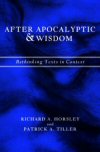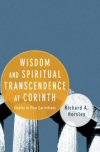Select Works of Richard A. Horsley (2 vols.)
Digital Logos Edition
Overview
How important is word study when evaluating the meaning of a passage or genre in the Bible? Through a collection of interrelated essays in two selected volumes, world-renowned researcher Richard A. Horsley explores the major sections of 1 Corinthians and the genre definition of apocalyptic and wisdom literatures. He seeks to correct commonly held views and believes that the study of words and symbols should not stand alone in a selected passage but that they are integral to the often overlooked broader picture of the sociological settings. Study with Horsley as he challenges you to see the panoramic view when evaluating the Bible and theological terminologies in its sociological contexts.
For more from Richard Horsley, check out The Prophet Jesus and the Renewal of Israel: Moving Beyond a Diversionary Debate.
Key Features
- Presents essays on 1 Corinthians and the apocalyptic and wisdom literatures
- Relates biblical and apocryphal settings to the modern world
- Defends the sociological approach in biblical studies
Product Details
- Title: Select Works of Richard A. Horsley
- Authors: Richard A. Horsley
- Publisher: Wipf & Stock
- Volumes: 2
- Pages: 524
- Resource Type: Collected Essays
- Topic: Biblical Studies
Individual Titles
- After Apocalyptic and Wisdom: Rethinking Texts in Context by Richard A. Horsley and Patrick A. Tiller
- Wisdom and Spiritual Transcendence at Corinth: Studies in First Corinthians by Richard A. Horsley

Coauthors Richard Horsley and Patrick Tiller seek to correct the genre definition of apocalyptic and wisdom literature often held in the study of early Judaism and the New Testament. They analyze the social-political context of the apocryphal writings of 1 Enoch and 4 Ezra, Ben Sira’s sociological research of the Second Temple, and Apocalypticism in the Gospels. They also examine the genres of Q, the Gospel of Mark, and the Epistle of James. In conclusion, Horsley and Tiller argue that the social settings of these sources prove that the genre definition of the apocalyptic and wisdom literature needs to be revised.
These essays achieve a much needed demolition of two ill-defined concepts that have dominated the study of early Judaism and the New Testament. Turning from questions of worldview and genre to the historical and social realities confronting the authors of Sirach, 1 Enoch, the Epistle of James, and 4 Ezra, Horsley and Tiller demonstrate how these texts engage with the political realities of their time, especially imperial rule. This is an eloquent demonstration of the value of the social-scientific approach to the exegesis of biblical and parabiblical texts.
—Philip Davies, professor, University of Sheffield
The terms wisdom and apocalyptic, the authors argue correctly, have been used in such a vague or simplistic way by many scholars that a series of corrections are necessary. Horsley and Tiller . . . address the problems of genre definition, the social and political context of the texts, and the twentieth-century theological assumptions that lie behind the previous studies. They forge new conclusions about the interpretations of many important texts.
—Lawrence M. Wills, Episcopal Divinity School
Patrick A. Tiller is a member of the Enoch Seminar and author of A Commentary on the Animal Apocalypse of 1 Enoch.

Examining each of the major sections of 1 Corinthians, Richard Horsley probes the disagreement Paul had with people who were claiming special spiritual status. The conflicts over what constitutes wisdom, knowledge, and spirituality cut to the core of what Paul was trying to accomplish in his communities. Horsley moves the debate from the history of religions background to the Hellenistic Jewish religiosity of the Wisdom of Solomon and Philo of Alexandria.
In these landmark essays, gathered together here for the first time, Richard Horsley combines a close reading of the language against which Paul argued in 1 Corinthians with a careful study of the way similar language was used in Philo and the Wisdom of Solomon. . . . These essays offer important insights for everyone engaged in current discussions of gender, power, and patronage in Corinth.
—Neil Elliott, author, Liberating Paul
Those who work with 1 Corinthians have long valued the sequence of essays by Richard Horsley on the conflicts and disagreements of which the letter gives plenty of evidence. However, the essays, written in the late ’70s, have too often been overlooked as discussion of 1 Corinthians has become dominated by sociological and rhetorical perspectives. So it is very good news to know that the essays have been gathered together in this volume, which I warmly recommend to present-day students of 1 Corinthians.
—James D.G. Dunn, Lightfoot Professor of Divinity Emeritus, Durham University
About Richard A. Horsley
Richard A. Horsley is Distinguished Professor of Liberal Arts and the Study of Religion at the University of Massachusetts and a pioneer of sociological approaches to biblical studies. He is a world-renowned researcher on themes of empire and resistance in the Bible, with a focus on how these issues relate to the modern world. He is the author and coauthor of numerous books, including Jesus and the Powers: Conflict, Covenant, and the Hope for the Poor, John, Jesus and the Renewal of Israel, Performing the Gospel: Orality, Memory, and Mark, and The Prophet Jesus and the Renewal of Israel: Moving Beyond a Diversionary Debate.